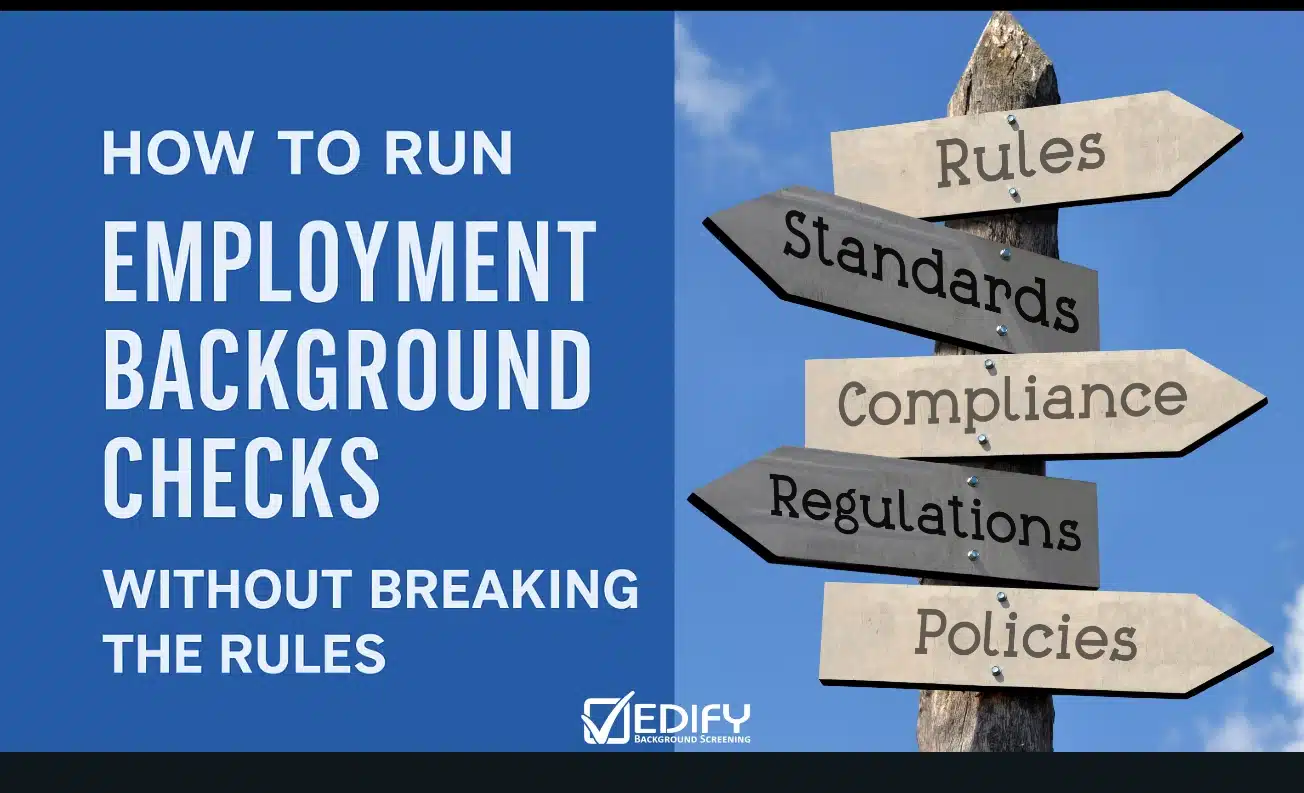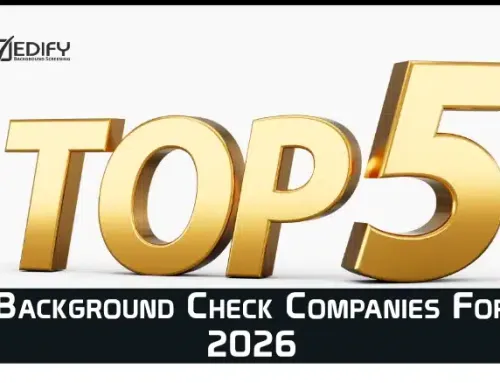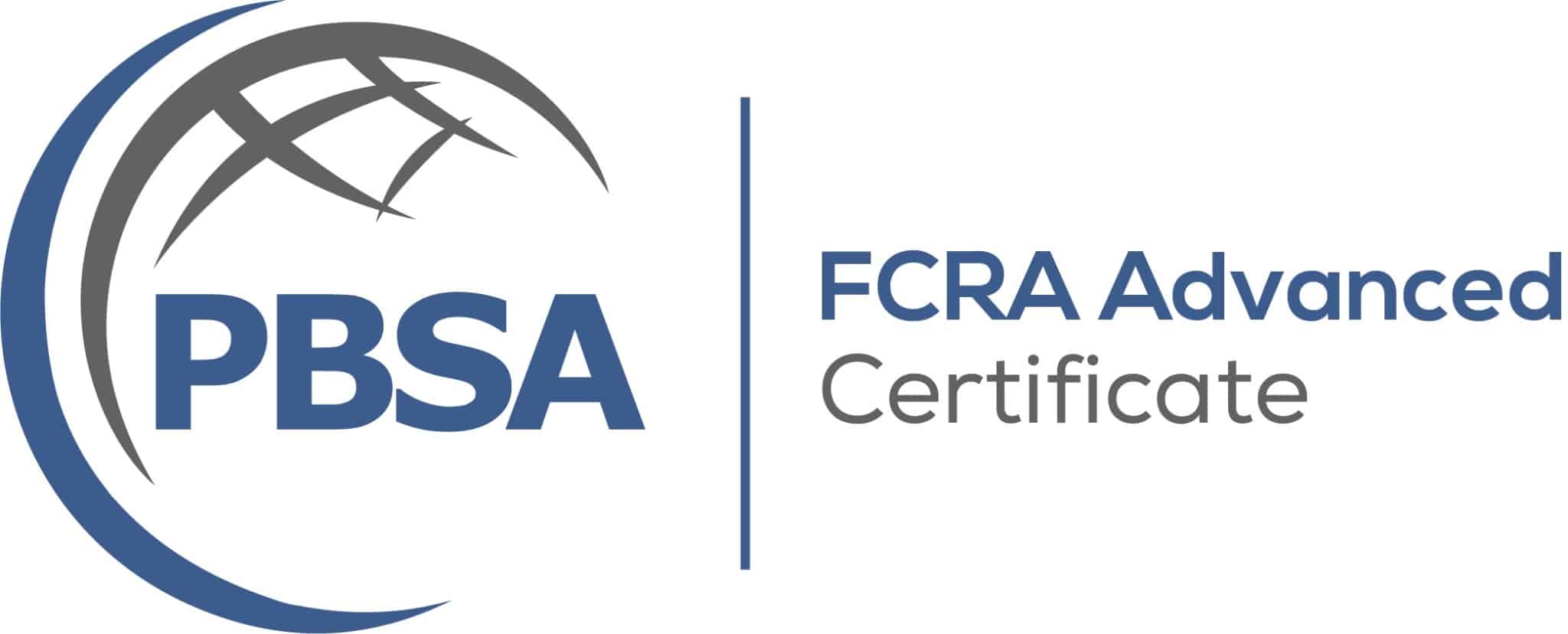What Are the Rules for Employment Background Checks in 2025?
By Chas Scott, EDIFY Background Screening
Employment background checks are essential for reducing risk and protecting your workforce, but they also come with strict rules. For small and mid-sized businesses (SMBs), failing to follow these rules can lead to compliance violations and costly lawsuits.
In this guide, we’ll break down the federal, state, and local rules that apply to employment background checks in 2025—and how your business can stay compliant.
1. Build a Formal Screening Policy
Compliance starts with a documented process. A background check policy ensures fairness, reduces bias, and protects your company in case of disputes.
Your policy should include:
-
Written procedures for requesting and reviewing background checks
-
Candidate authorization and disclosure forms
-
Role-based screening criteria
-
A clear adverse action process
-
Secure data storage and retention
Rigid “no-hire with a record” policies are no longer legal. The EEOC and several states now require individualized assessments, meaning you must consider the nature of an offense, when it happened, and its relevance to the role.
2. Always Get Written Consent
The Fair Credit Reporting Act (FCRA) requires employers to get written consent before ordering a background check. This authorization must be clear, separate from the job application, and easy to understand.
Best practices:
-
Provide a stand-alone disclosure and authorization form.
-
Include the federally required Summary of Rights Under the FCRA.
-
Include state-specific disclosures where required.
-
Keep signed forms on file for audit purposes.
Pro tip: Digital forms are the easiest way to stay compliant. Utilize a CRA that has the ability to allow candidates to sign electronically, while creating an audit trail for your records.
👉 Learn more about General Business Background Checks.
3. Follow Federal, State, and Local Rules
The FCRA sets the national baseline, but many states and cities go further.
Key updates in 2025 include:
-
Clean Slate laws: Some states automatically expunge or seal certain records.
-
Ban the Box laws: Many jurisdictions prohibit asking about criminal history early in the hiring process.
-
State restrictions: Some states limit how far back convictions can be reported (often 7 years).
-
Local ordinances: Cities may impose additional compliance layers beyond state law.
Bottom line: HR leaders must stay up to date. What’s legal in one state may expose you to lawsuits in another—especially for businesses hiring across state lines.
4. Follow the Adverse Action Process
If you’re considering not hiring someone based on their background check, you must follow the “adverse action” process. Skipping steps is one of the most common—and expensive—employer mistakes.
-
Step 1: Send a pre-adverse action notice with a copy of the report and A Summary of Your Rights Under the FCRA.
-
Step 2: Wait at least five business days to give the candidate a chance to respond.
-
Step 3: If the decision stands, send a final adverse action notice.
This process gives candidates a fair chance to correct errors and ensures your company is in compliance with the law.
👉 Our Employment Background Screening Checklist includes sample notices.
5. Not All Background Checks Are the Same
A smart organization doesn’t use the same screening package for every role. Instead, it tailors the background check to the position being filled.
Examples:
-
Entry-level roles with direct supervision: Basic identity verification, criminal check, and employment history may be sufficient.
-
Financial, IT, or executive-level roles: More comprehensive checks such as credit reports (where legally permissible), professional license verification, and extended employment/education verification may be needed.
By aligning background checks with job responsibilities, companies balance compliance with business needs—while avoiding unnecessary costs and reducing turnaround times. See our Small Business Background Checks for affordable, role-appropriate solutions.
6. Choosing the Right Background Screening Partner
Not all background screening providers are the same. Large CRAs like HireRight and Checkr focus on high-volume, low-touch services designed for enterprise-level clients. These systems are efficient but often lack flexibility and personalized support. A model that doesn’t always work for SMBs that need personalized support.
At EDIFY Screening, we believe growing businesses deserve the best of both worlds:
-
Client-focused service with dedicated, U.S.-based support.
-
Flexibility to adapt your background screening packages to your roles and compliance requirements.
-
Technology-driven efficiency without sacrificing the human touch.
- Compliance-first processes that protect your business
Conclusion
In 2025, employers must follow clear rules when running background checks: secure consent, comply with the FCRA, adapt to state and local laws, follow adverse action steps, and tailor screening by role. With the right partner, small businesses can stay compliant while hiring confidently.
👉 Ready to simplify compliance? Compare background check pricing and get started today.
FAQ
Do small businesses have to follow the same background check rules as large companies?
Yes. The FCRA and state laws apply to all employers, regardless of size. Even small businesses must provide disclosures, obtain consent, and follow the adverse action process.
What are Clean Slate and Ban the Box laws, and how do they affect hiring?
Clean Slate laws automatically seal or expunge certain convictions after a set period. Ban the Box laws restrict when employers can ask about criminal history, usually delaying it until later in the hiring process. Both require employers to adjust their background check timing and scope.
Can I run the same background check package for all roles?
It’s not recommended. Tailoring background checks by role helps ensure compliance and cost-effectiveness. Entry-level positions may only need criminal checks, while executive roles often require credit, federal, or global watchlist checks.
What happens if I skip the adverse action process?
Failing to send the required notices before denying employment based on a background check can result in lawsuits and penalties. Following the pre-adverse and final adverse action steps is a legal requirement.
Do I need consent every time I re-screen an employee?
Yes. The FCRA requires fresh consent for every background check, even if it’s a re-screening of an existing employee. Employers who skip this step risk legal exposure.
Internal Resources to Explore
External Sources to Explore
The resources provided here are for educational purposes only and do not constitute legal advice. We advise you to consult your own counsel if you have legal questions related to your specific practices and compliance with applicable laws.













